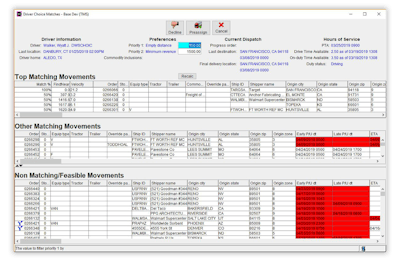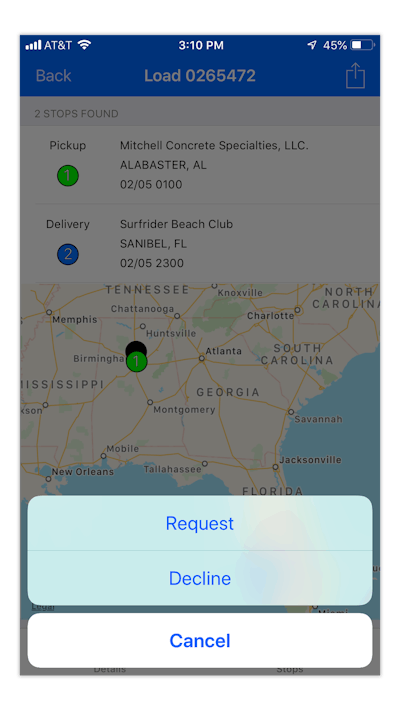 New driver load planning tools from McLeod Software help fleets better match loads with driver preferences.
New driver load planning tools from McLeod Software help fleets better match loads with driver preferences.McLeod Software has developed and released new features for its LoadMaster transportation management software that focus on helping carriers create a better work experience for drivers.
The new LoadMaster release of Version 19.1 has LoadMaster Driver Choice, a tool that fleets can use to give their drivers the ability to record their load preferences, and find the best matches for those preferences. It also gives carriers the ability to offer choices about available loads when possible.
For owner operators, the Driver Choice tool enables a carrier to give its drivers better tools to successfully run their business within the fleet, particularly when paired with the McLeod Driver Mobile App and information the app provides about pay and expedites the entire settlement process, the company says.
LoadMaster Trip Management is a new module that gives carriers tools to interactively plan details of trips with the driver’s input, and actively manage trips while underway. The module uses a driver’s current Hours of Service (HOS) and position information to create and display the trip in LoadMaster.
The plan takes into account road conditions, live and historical traffic patterns, and driver breaks. The calculation gives fleets the a more accurate Estimated Time of Arrival (ETA) for customer stops to proactively deal with potential service incidents.
The trip plan feeds McLeod’s ETA/Out-of-Route module to let the carrier’s staff know when trucks are late for scheduled stops or out of their recommended routes. It also interacts with McLeod’s existing Driver Feasibility functions to enhance the accuracy of planning, the company says.
McLeod’s Driver Feasibility function determines whether or not a driver can physically pick up and deliver the load on time based on their current position, the distances involved, the appointment windows for pick-up and delivery, and their available HOS to accomplish the trip.
 McLeod Software has a mobile app for drivers that can be used to offer loads to drivers.
McLeod Software has a mobile app for drivers that can be used to offer loads to drivers.The interactive nature of McLeod’s new Trip Management module gives the driver the opportunity to be part of the planning process.
McLeod Software has expanded integration solutions with Manhattan Associates as well. A new interface offers visibility to Manhattan’s Load Analyzer scoring metrics upon receiving an EDI load tender. Tenders can be accepted and orders created automatically based upon predetermined score criteria.
Another key interface introduced in version 19.1 is Manhattan Profit Analyzer. LoadMaster general ledger revenue and expense information is sent to analyze the key factors affecting profitability and target problem areas with poor utilization. With the Manhattan Fuel & Route interface, LoadMaster version 19.1 will automatically communicate movement data and current fuel levels to Fuel & Route during dispatch to determine optimal door-to-door routing and fuel recommendations while balancing driver requests and preferences.
New Capabilities for LTL
LoadMaster LTL, a version for carriers with multi-stop routes, has a new Delivery Routing Optimization module that optimizes the sequence of deliveries routed on a local movement. Route Optimization takes a set of routed deliveries and optimizes the stops based on minimal drive time, while also considering appointment commitment freight, a location’s open and close times, and the time spent unloading per stop. This module also considers potential turn time to allow for pickups based on ending at a specific delivery point.
McLeod says the Capacity Planning module developed for LoadMaster LTL provides a global view of the freight passing through a carrier’s network with visibility to better plan routes both inbound and outbound. The network may include company owned locations or third party locations.
PowerBroker updated
On the brokerage side, McLeod Software offers its PowerBroker users a new integration with HubTran to quickly process incoming carrier documents and invoices. Powerbroker communicates load and carrier data to HubTran and returns approved invoice data and documents to PowerBroker.










